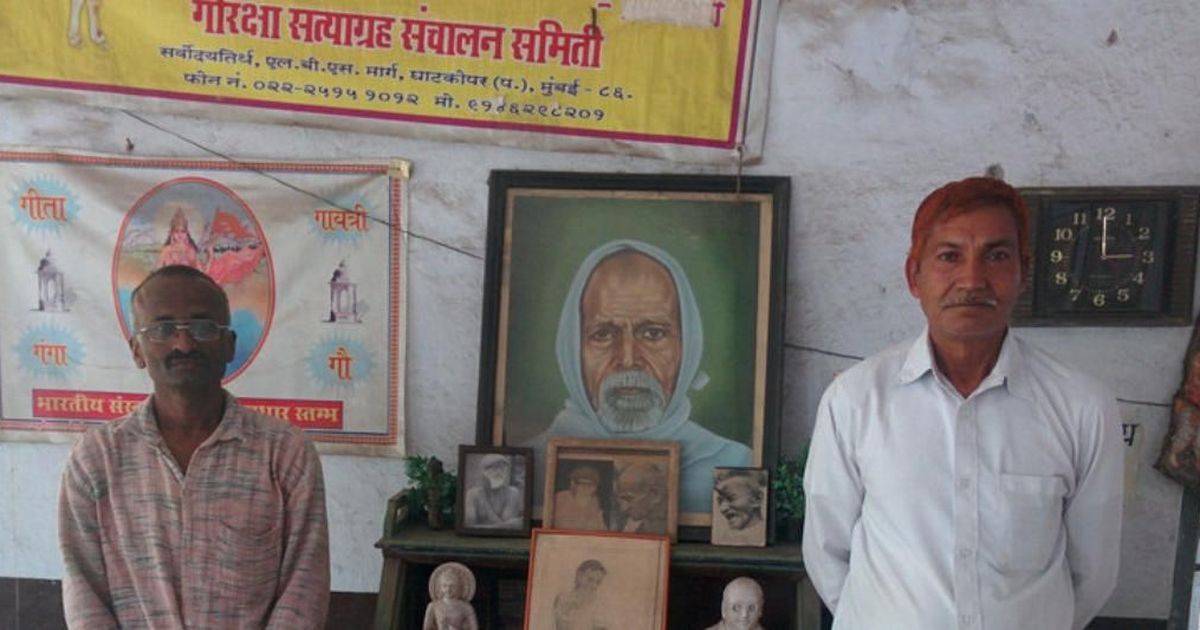A member of India’s longest satyagrah speaks out.

Photo credit: Scroll
Days after a mob assaulted two women, an old man and a child in the name of cattle protection in Jammu and Kashmir, and weeks after another group of vigilantes murdered a man named Pehlu Khan in Rajasthan as he was transporting two cows, a member of India’s longest-running satyagrah to end cattle slaughter has spoken out against such violence.
“Jo hinsa karta hai, voh gau rakshak hai hi nahi [Those who commit violence cannot be cow protectors],” said Baldevraj Ilwadhi, 76, in an interview with Scroll.in about the new crop of cow protection groups that have emerged in the last few years. “I appeal to them not to fight or attack people. I know there are even some who extort money from people. I ask them instead to focus on creating pressure on the government.”
Ilwadhi is a member of the Goraksha Satyagrah Sanchalan Samiti, a Gandhian group once led by Vinayak Bhave, commonly known as Vinoba, which conducted a three-decade long civil disobedience campaign against cattle slaughter in Maharashtra.
For 33 years, Ilwadhi and others in the Vinoba Bhave-inspired group went regularly to the abattoir in Deonar, Mumbai, to waylay trucks bearing cattle for slaughter. The police, in turn, would detain them and release them almost immediately – only for them to repeat the process the next day. Their campaign – India’s longest such protest – ended with the state’s ban on bull and bullock slaughter in March 2015. Scroll.in had interviewed the group at the end of their protest.
“Anyone who has even some humanitarian feeling will be hurt by these incidents [of violence],” Ilwadhi wrote in a formal statement he posted to Scroll.in. “We at least were as hurt on hearing this news [of Pehlu Khan’s murder] as his family must have been. These incidents damage the cause of cattle protection.”
Need constitutional remedy
Ilwadhi explained that members of modern cow protection groups become angry when they see injustice being done in front of them, but the main culprit is the government for allowing slaughter to continue. The government itself is selling meat, he said, and so has more blame to shoulder than individual cow protection groups.
That said, Ilwadhi believes there is no reason to ban cow protection groups in the name of stopping this violence. The Supreme Court, responding to a petition by social activist Tehseen Poonawalla, asked the Centre and six states in April to explain within three weeks why cow protection groups should not be banned. The next hearing for this case is listed for May 2.

The Constitution already has laws against murder and violence, which are the laws with which violent cow protection groups should be dealt with, Ilwadhi wrote in his statement. What is not yet in the Constitution is a national law that will put an end to all cattle slaughter and, by extension, to violence against those who transport or butcher cattle.
Even as Ilwadhi holds firm in his stance against violence resorted to by cow protection groups, he also spoke sternly against the violence he claims to have seen perpetrated by those who operate slaughterhouses, who, he claims, have even murdered for their cause.
“There is only one solution to stop cattle slaughter – if the government enacts a law against it,” Ilwadhi said. “Once they do that, the prices of goat meat will also go down and people will want to have that instead.”
Protest goes on
Ilwadhi’s long protest has taken its toll on him. Now 76, he has had surgery on his hernia and is too weak to travel. He is also effectively homeless – after years of peaceful protest at slaughterhouses across Maharashtra, Ilwadhi has lost all familial roots.
As long as Ilwadhi and his companions were protesting, the trustees of Mumbai’s Sarvodaya Hospital in Ghatkopar allowed them to live in a ward on the second floor of an annexe building in the hospital compound. Hospital employees still remember them as the gausevak satyagrahis who once lived there. Ilwadhi, the last such satyagrahi left in Mumbai, has the trustees’ permission to stay on.
Ilwadhi presented an array of reasons why cattle slaughter should stop, including climate change and the inherent violence associated with it. He once saw a buffalo pass him on its way to the slaughterhouse with tears streaming down its eyes. Ilwadhi also appeals to seemingly more rational sentiment. He claims that slaughterhouses are so polluting, both to the water and the air, that a hole in the ozone layer has built up over Kanpur because of the city’s vast trade in leather, and that the presence of slaughterhouses has exacerbated the air pollution in Delhi.
“Poor people, both Hindus and Muslims, actually don’t want cattle slaughter,” he continued. “People in villages are poor and they feel they have no other option but to take their cattle to slaughter. But even then there have been Muslim butchers who tell me they don’t want to do this and they have no choice. That is why it is the duty of politicians to help them out of this.”
Despite the present government’s avowed position of working to end cattle slaughter, Ilwadhi bemoaned its relative inaction.
Ilwadhi said, “There have been three years of the Modi government and all he does is talk. He still has not enacted any law about this. We told the Congress for so long to enact this and now see how they have fallen. Our warning to this government is that they too will fall if they do not act to protect cattle.”
This story first published on Scroll is republished with permission.